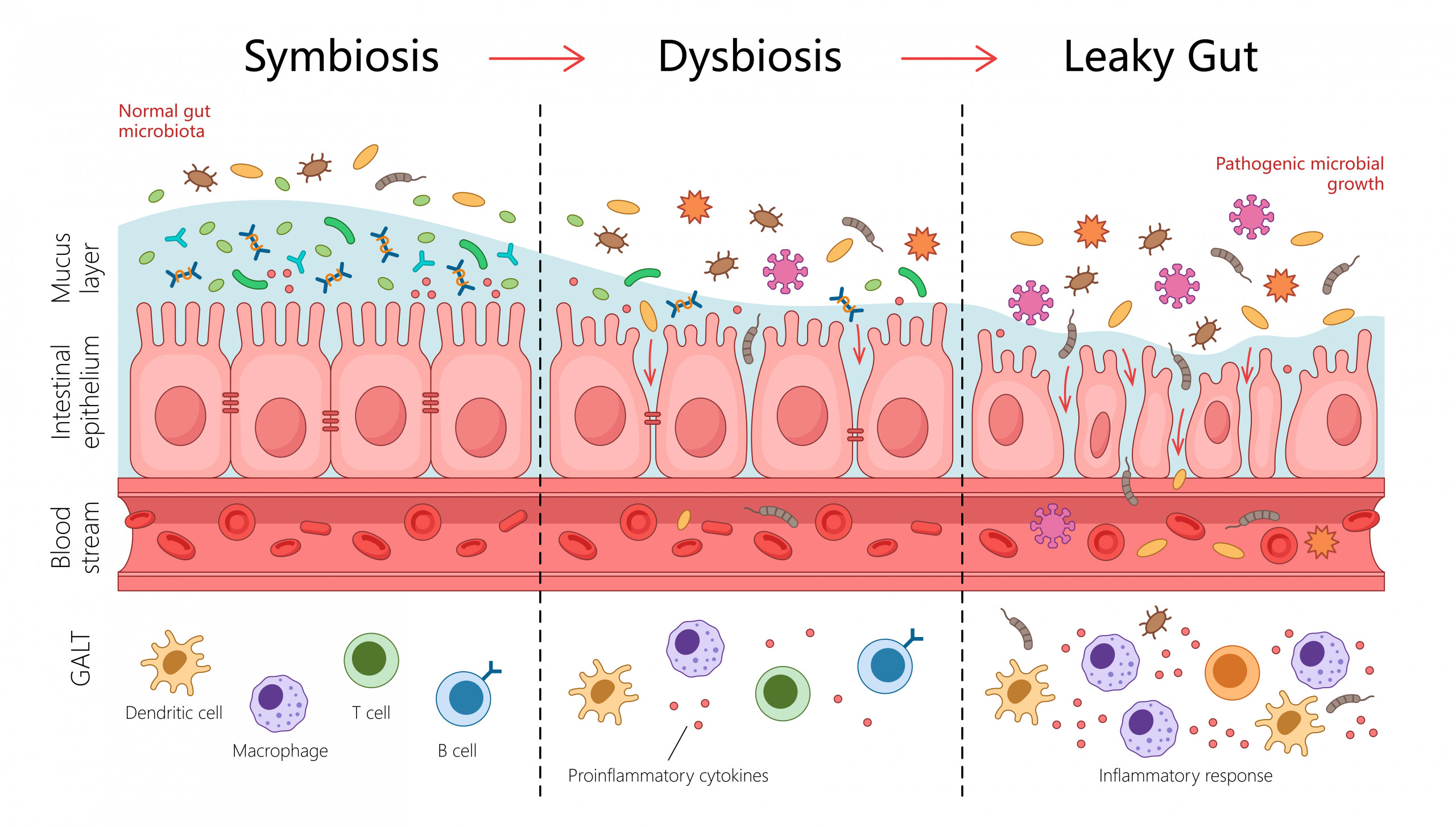Leaky gut syndrome: how a permeable gut affects your health
Do you often have digestive problems, unexplained tiredness or suffer from skin problems, auto-immune disorders and inflammation? Perhaps a leaky gut is behind it – an often overlooked but widespread cause of many health complaints. A leaky gut can lead to harmful substances entering the bloodstream and polluting the body. The result: chronic inflammation, food intolerances, autoimmune diseases and even psychological symptoms.
But what exactly is leaky gut, how does it develop and, above all, how can you cure it? In this article, you will learn everything you need to know about the causes, symptoms and the best strategies to improve your gut health – for more energy, well-being and a strong immune system!
What is leaky gut?
The term leaky gut describes a disorder of the intestinal barrier in which the intestinal wall loses its protective function. Normally, an intact intestinal wall ensures that only nutrients and water enter the bloodstream, while harmful substances, pathogens and undigested food components remain outside. However, if the intestinal wall is damaged, unwanted substances can enter the body and trigger inflammatory reactions.
This phenomenon is increasingly being recognized as the cause of various health complaints, including digestive problems, chronic inflammation, autoimmune diseases and even mental disorders. But what are the causes of leaky gut and how can it be treated?
Causes
Die Entstehung eines Leaky Gut ist oft ein schleichender Prozess, der durch verschiedene Faktoren beeinflusst wird. Dazu gehören:
1. Ungesunde Ernährung
Eine Ernährung mit einem hohen Anteil an Zucker, industriell verarbeiteten Lebensmitteln, Gluten und ungesunden Fetten kann die Darmflora schädigen und die Darmwand durchlässiger machen. Vor allem Gluten wird häufig als eine der Hauptursachen für Leaky Gut diskutiert, da es bei empfindlichen Personen die Produktion von Zonulin fördert – ein Protein, das die Darmbarriere lockert.
2. Chronischer Stress
Stress in jeglicher Form hat einen erheblichen Einfluss auf die Darmgesundheit. Dauerhafter Stress erhöht die Produktion von Cortisol, einem Hormon, das Entzündungen fördern und die Darmwand schwächen kann. Viele Menschen mit Leaky Gut berichten von einer Verschlechterung ihrer Symptome in stressigen Zeiten.
3. medication and chemotherapy
Long-term use of antibiotics can unbalance the natural intestinal flora and thus weaken the intestinal barrier. Non-steroidal anti-inflammatory drugs (NSAIDs) such as ibuprofen or aspirin can also damage the intestinal mucosa and thus contribute to leaky gut. Chemotherapy can also cause considerable damage to the intestinal mucosa.
4. harmful and irritating substances
Various environmental toxins and additives can attack the intestinal wall and promote inflammatory processes. These include
- Colorants and preservatives in food
- Heavy metals that may be contained in dental materials, finished food products, cosmetics, drinking water or, in some cases, medicines
- Soap substances (e.g. washing-up liquid) that break down the mucus on our mucous membrane and thus reduce the protection of the intestinal wall
- Alcoholic beverages
- Nicotine
- Contaminated drinking water (e.g. due to hormone or antibiotic residues)
- Air pollution
5. intestinal dysbiosis (imbalance of the intestinal flora)
A healthy intestinal flora consists of trillions of beneficial bacteria that ensure intact digestion and immune function. If this balance is upset by poor diet, antibiotics or infections, harmful bacteria can take over and damage the intestinal wall – a typical sign of leaky gut. An altered composition or colonization of the intestinal flora can also play a role.
6. lack of protective substances and vital substances
- Too little mucus on the intestinal mucosa can make the intestinal wall more susceptible to damage.
- A vitamin or mineral deficiency impairs the regeneration of intestinal cells, as all structures of the body need these nutrients to function.
7 Other factors
- Chronic lack of exercise can have a negative impact on intestinal health.
- Intake of foods to which the person is allergic or intolerant can cause chronic inflammation in the intestine.
- Stressed digestive organs such as the pancreas, stomach, liver and gall bladder can disrupt digestive processes and contribute to the development of leaky gut.
- Other inflammations or diseases in the body can also affect the intestinal barrier.
Symptoms
The symptoms of leaky gut can be very diverse and do not only affect the digestive tract. Typical signs are
- Digestive problems: Flatulence, diarrhea, constipation or irritable bowel symptoms
- Chronic fatigue: a lack of nutrients due to impaired bowel function can lead to a lack of energy
- Skin problems: eczema, acne or rosacea can be linked to a permeable gut
- Food intolerances: People with leaky gut are often more sensitive to gluten, lactose or histamine
- Joint pain: Inflammatory processes in the body can trigger pain and stiffness in the joints
- Psychological symptoms: Anxiety, depression and concentration problems are common side effects
- A weakened immune system: recurrent infections, including urinary tract infections
- Allergies: Both food allergies and other allergic reactions
- Inflammation in the body: joint inflammation, increased sensitivity to pain
- Hormonal disorders: Imbalances in the hormonal system
- Headaches and migraines
- Tiredness, weakness, muscle weakness
Many of these symptoms are often not directly associated with the gut, which is why diagnosing leaky gut can be a challenge.
Diagnosis
As leaky gut is not a recognized medical diagnosis, there is no standardized test. Nevertheless, there are various methods for detecting increased permeability of the intestinal wall:
- Zonulin test: Zonulin is a protein that regulates the intestinal barrier. An elevated zonulin level in the blood or stool can indicate a damaged intestinal wall.
- Lactulose-mannitol test: In this test, the two types of sugar are drunk and later measured in the urine. Increased excretion indicates increased permeability of the intestinal wall.
- Intestinal flora analysis: An examination of the intestinal bacteria can provide information about an imbalance that could be associated with leaky gut.
Treatment and healing of leaky gut
The good news is that leaky gut is treatable. A targeted change in diet and lifestyle can regenerate the intestinal wall and alleviate the symptoms. Colon cleansing helps.
1. change of diet
Diet plays a decisive role in the healing of leaky gut. The following measures can help:
- Avoid gluten, sugar and processed foods: these substances promote inflammation and damage the intestinal wall.
- More fiber: Vegetables, fruit and fermented foods (e.g. sauerkraut or kimchi) support healthy intestinal flora.
- Good fats: Omega-3 fatty acids from fish, linseed and walnuts have an anti-inflammatory effect.
- Bone broth: Contains collagen and amino acids that strengthen the intestinal wall.
- Probiotics and prebiotics: Support the development of healthy intestinal flora.
2. stress reduction
As stress plays a major role in leaky gut, techniques such as meditation, yoga or breathing exercises should be integrated into everyday life. Sufficient sleep is also essential for the regeneration of the gut.
3. food supplements
Various nutrients can support healing:
- L-glutamine: An amino acid that regenerates the intestinal mucosa.
- Zinc: Promotes wound healing and reduces inflammation.
- Curcumin: Has strong anti-inflammatory properties.
- Vitamin D: Supports the immune system and the intestinal barrier.
4. avoidance of environmental toxins
Where possible, organic food should be preferred and plastic packaging avoided to reduce contact with harmful substances.
The psychological component
A permeable gut shows that the protective wall that should actually be there has become fragile. From a psychological perspective, this can mean that you are too susceptible to external opinions and energies. Perhaps there are people around you who keep talking down to you so that your inner defenses slowly give way – just like the intestinal mucosa, which loses its protective function due to repeated stress.
In front of the actual intestinal barrier is a protective layer of mucus containing good bacteria and immune cells. However, these “protective soldiers” are often alsomissing on a psychological level. If too many stimuli enter the system via a permeable intestinal wall, the entire system is set on defense. The body constantly recognizes foreign influences that do not actually belong in it and reacts with a defensive attitude. This is transferred to the psychological experience: People with leaky gut are often permanently in a mental defensive posture, react more sensitively to external influences and find it difficult to distinguish between helpful and harmful information.
In the long term, this can lead to those affected not only fending off external influences, but also no longer being able to accept positive stimuli and support from outside. The next stage of this development is autoimmune diseases: The immune system begins to attack the body’s own structures because it can no longer clearly distinguish between self and other. This psychological dynamic often manifests itself in the form of self-doubt, self-criticism and a constant inner struggle. Thoughts such as “Why can’t I do this?” or “Why can’t I set myself apart?” become increasingly frequent. In the long term, this can lead to frustration, self-sabotage and chronic exhaustion – a vicious circle that manifests itself on both a physical and psychological level.
Conclusion
Leaky gut is a serious problem that can cause many health complaints. As the symptoms are varied and are often not directly associated with the gut, the condition often goes unrecognized. However, a targeted change in diet, stress reduction and a conscious lifestyle can improve intestinal health in the long term.
Anyone suffering from chronic complaints should consider the possibility of leaky gut and, if necessary, take specific measures to cure it. After all, a healthy gut is the key to a healthy body and well-being.


Leave A Comment